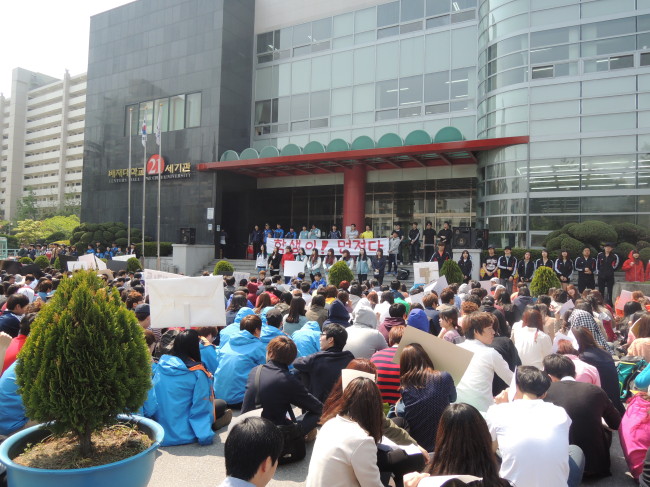최근 정부재정지원 제한대학으로 지정된 배재대학교가 학제개편안을 발표했는데, 이 개편안에는 국문과를 한국어학과와 합쳐져 한국어문학과로 통합하는 안이 있어 논란이 일고 있다.
학교 측에서는 이를 두고 “국문과를 없애는 것은 아니다”고 밝혔으나, 국문과 학생들은 “130년 가까이 지켜온 배재학당(설립 1885년)의 교육정신의 맥을 끊으려 하고 있다”고 크게 반발했다.
이번 사태는 배재대학교의 전신인 배재학당이 국어연구의 기념비적인 인물인 주시경 선생과 민족시인 김소월 등을 배출한 역사가 깊은 곳이어서 더욱 충격을 주고 있다.
최근 철학과 등 인문계 학과들이 통합되거나 폐과되는 일이 계속되는 가운데, 수년째 계속 언급된 인문학의 위기론이 다시 고개를 들고 있다.
취업난이 장기화됨에 따라 학생들이 취업에 직접적인 도움이 되지 않는 인문학 공부를 피하고 있다는 것이다.
그러나 이에 반해 인문학이 부흥이 일어나고 있다는 주장도 제기되고 있다.
서울대를 포함한 일부 대학에서는 일반인들을 대상으로 한 인문학 강좌를 제공하는가 하면, 인문학을 가르치는 온라인 강의와 팟캐스트 등이 크게 인기를 끌고 있다. 또한 성남시 평생학습센터의 ‘지호락 인문학 콘서트’처럼 정부나 기업 등에서 인문학 프로그램을 지원하는 경우도 있다.
인문학의 부활인가, 위기인가? 이러한 의문에 대해 “조선의 뒷골목 풍경”의 저자로 유명한 부산대 강명관 교수는 “교양으로서의 일반인들 사이에서 인문학의 상당히 수요가 크다”면서도 인문학을 교육하는 과정에서 문제가 있다고 지적했다.
강 교수는 “인문학이 망하네마네 하는 것은 그 책임의 대부분은 이 사회 자체에 있다”면서 사람을 무한경쟁으로 몰고 가는 사회 시스템의 문제를 꼬집었다.
그는 입시지옥으로 인해 아이들이 책을 읽을 기회가 없으며 인문학적 소양을 쌓을 기회가 적기 때문에 사회에 나간 한참 후에야 인문학에 대한 갈구가 더 심해지는 것이라고 분석했다.
젊은 학생들에게 인문학적 소양이 부족하다는 설은 여러 연구결과로 나타나고 있는데 특히 젊은 층 사이에서 역사지식이 크게 부족한 것으로 나타났다.
국가보훈처가 올해 초 국민들을 대상으로 벌인 설문조사에 따르면 20대 이하 중 6•25 한국전쟁에 대해 모른다는 답을 한 사람이 23.2%에 달했다. 이는 다른 세대 중 한국전쟁에 대해 모르는 사람이 10%이내인 것에 비해 크게 차이가 나는 것이다.
이러한 점은 학생들 사이에서 국사과목이 외면받는 현상과도 관련이 있는 것처럼 보인다. 작년 새누리당 김태원 의원이 교육과학기술부로부터 받아 발표한 자료에 따르면 국사가 선택과목이 된 2005학년도 수능에서 응시자의 27.7%가 국사를 선택했지만 이후 국사선택 비중이 매년 하락해 2012학년도에는 6.9%로 떨어졌다고 한다.
또한 문화체육관광부에 따르면 지난 2011년, 1년동안 책을 한권이라도 읽었다는 사람은 성인들 중 66.8%에 불과해 94년 (86.8%)과 비교해 무려 20%가 하락했다. 학생들의 경우 83.8%를 기록해 94년 이후 가장 낮은 수치를 기록했다.
이렇듯 입시에 치중한 교육과정으로 인해 외면받은 인문학을 사회인들이 찾게 되면서 일반인들 사이에서 인문학에 대한 수요가 생겨난다는 것이 강 교수의 분석이다.
그러나 강 교수는 이러한 현상이 부자연스럽다며 “적어도 대학교까지 거치면서 자연스럽게 교양 같은 것을 쌓아야 하고, 그 교양을 바탕으로 해서 사회 나가서 여러가지 활동도 해야 한다”고 지적했다. (코리아헤럴드)
<관련 영문 기사>
Humanities in Korea: Revival or crisis?
By Yoon Min-sik
South Korea’s Pai Chai University recently announced an organizational overhaul that will merge several humanities departments, touching off a debate on the “crisis of humanities.”
At the center of discussion was the school’s decision to merge the Korean Language and Literature Department with the Department of Teaching Korean as a Foreign Language. Pai Chai, which has produced top-notch literary figures such as poet Kim So-wol and linguist Ju Si-gyeong, will have no dedicated Korean literature department after the merger.
Pai Chai students majoring in Korean literature cried foul, saying that the school’s decision was unilateral and that it made no sense to integrate departments with such different curriculums.
“It is impossible to merge two departments but the university is adamant on its position,” said Jeong Ji-hong, leader of the student body representing the Korean Language and Literature Department in an interview.
Pai Chai’s choice, however, is not an isolated one. Across the nation, Korean universities are scrambling to shut down unpopular humanities departments. Hannam University is reportedly planning to eliminate departments which receive the poorest scores in internal evaluation.
The trend against humanities departments at colleges is partly due to the dismal employment rate of graduates of literature, philosophy, history and other academic disciplines that have no explicit link to a career. According to a survey by Job Korea, 70.3 percent of respondents who graduated with humanities-related degrees said their major did not help them get a job.
Most students favor business administration and other popular majors that boost their chances of landing a job.
The near-collapse of humanities as legitimate academic courses in higher education, however, might be overstated. The humanities have faced trouble in recent years but there are signs of hope, as the public is increasingly drawn to the study of humanities as part of lifelong education and self-improvement efforts.
On some campuses in Korea, new courses and programs focused on humanities that target the general public are popping up. For instance, state-run Seoul National University and other prestigious colleges are introducing special humanities courses.
Similarly, online education is discovering the value of humanities subjects. Hunet.com, a major e-learning provider, said the number of users taking humanities classes doubled in 2012 from a year earlier.
As for the conflicting interpretations about the status of humanities in Korea, Kang Myeong-kwan, professor at Pusan National University, said the two different views are closely interconnected.
“The fundamental problem behind it (the crisis of humanities) is a social system that makes its members compete all the time, whether it is for college admission or job seeking,” Kang told The Korea Herald.
He added that the current education system deprived students of opportunities to study humanities and the unfulfilled desire to study the subjects resurfaced as they got older, a process he described as “unnatural.”
As a result, historical knowledge of young Koreans is alarmingly low. According to a survey of the Ministry of Patriots and Veteran Affairs, 23.2 percent of respondents at age 20 or younger had no knowledge of the 1950-1953 Korean War. Another survey by the Joongang Ilbo said that nearly 1 out 4 Korean students thought that the Korean War was started by Russia (12.1 percent) or the United States (11.5 percent).
(
minsikyoon@heraldcorp.com)






![[Exclusive] Hyundai Mobis eyes closer ties with BYD](http://res.heraldm.com/phpwas/restmb_idxmake.php?idx=644&simg=/content/image/2024/11/25/20241125050044_0.jpg)
![[Herald Review] 'Gangnam B-Side' combines social realism with masterful suspense, performance](http://res.heraldm.com/phpwas/restmb_idxmake.php?idx=644&simg=/content/image/2024/11/25/20241125050072_0.jpg)
